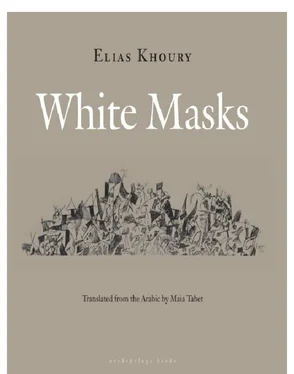“We will fit you with a glass eye.”
“There’s no need for that,” I replied.
I went back to bed, thinking I would wear a black patch over my eye, like Moshe Dayan did. Then I could go back to being a fighter. I had thought I was finished, but no: if Moshe Dayan could defeat the Arabs with one eye, then I too could be a fighter. That’s what I told the doctor.
He said they were sending me to Spain for an operation to get fitted with an artificial eye. “They’ll also do some tests on your left eye, which is slightly at risk. It has been affected by the shock, and the doctors in Spain will have a look at it.”
Once I got to Madrid I called Kamal from the hospital. Then he called me every day; Lily called me too, she had a beautiful voice; they’d comfort me and tell me I had to join them in America. But what would I do in America? As far as I was concerned, America was our enemy. I wouldn’t go, no way.
There were four of us, in one room, in a hotel called “La Pallas.” We’d set off for the hospital with our minder every morning and usually returned at midday. The Yemeni cursed constantly and told us about qat and how foreign women liked it because sex was always better after chewing some.
“And qat tastes so good, too!” he’d say. “Mmmm… qat and tea, then beer, and you’re up for it the rest of the night!”
He would feel around the gauze-covered depression that used to be his eye and curse the doctor. There was also Nabeel Amer, a short little guy who went on and on about Germany, with its steel mills and turneries. And there was Sameeh al-Ashiab, who hid his eyes behind dark glasses and never once addressed us. He spoke only to our minder. And there was me.
One day, Nabeel Amer came back to the hotel, jumping for joy. He hollered all the way down the hotel corridors that he was loaded with pesetas! I don’t know where he got hold of the money, but that night we all went out to a restaurant to celebrate.
At the restaurant, the Yemeni said he’d have a beer because wine made you drunk. Nabeel made such fun of him. “You don’t know what being drunk is,” he told him. “This wine won’t make you drunk, this Spanish wine, pfff. .! Do you know what ’annaybeh is? I’ll tell you! In al-Khalil, the town of Hebron, where I come from, wine is prohibited — it is haram. So we drink ’annaybeh instead: you take grapes and sprinkle them with water and sugar and then put them out on large trays in the sun. After a few days in the sun, when the mixture has turned into ’annaybeh, you go out there and scoop up the grapes swimming in their juice with great big spoons and, oh boy, do you feel giddy! Now that’s getting drunk. Our religion prohibits drinking, but it doesn’t prohibit ’annaybeh. And believe you me, just one spoonful of ’annaybeh is enough to knock out even the most hardened drinker!”
Nabeel drank steadily as we sat in the restaurant, in the din of Spanish voices and the clatter of cutlery on china. All of a sudden, he bellowed, “My eyes! If only it weren’t for my eyes!”
“We’re all in the same boat!” the Yemeni told him.
“Yes, but if it weren’t for my eyes, I could go back to Germany! Now, I can’t go back to the factory in Berlin. A turner has to have perfect eyesight, and I have none at all. When the doctor said I was completely recovered, I told him I couldn’t even see as well as when I was blind drunk on ’annaybeh! Things looked blurred, all the colors seemed wrong, everything was enveloped in a veil of fog. The doctor said I should go to Spain and gave me a referral. And so here I am in Spain. But you tell me, what can Spain achieve when Tall al-Zaatar 6achieved nothing? Nothing is as precious as our eyesight!. . Oh, brother, how come you can all see?”
Later, when we left the restaurant, the Yemeni went back to the hotel, and Nabeel and I walked together through the Madrid evening. We came across a couple of girls, Nabeel suggested we try and pick them up. “European girls are different from ours, they’re always game.” But as we approached, three guys emerged from the darkness. They were loud and brash and made menacing gestures, spoiling for a fight. Nabeel braced himself but I pulled him away.
“You didn’t survive Tall al-Zaatar to die here! Women can also be a cause. . ours is not the only one. But don’t get the two mixed up!”
Nabeel had been so seriously wounded, it was a wonder he was alive. Yet here he was, practically blind, leaping around the streets of Madrid as if it were outer space.
“Tell me about Tall al-Zaatar,” I said, “tell me how you escaped.”
“We just did,” he said, adding that the hardest thing was the march through the hills. “Dozens of us, fighters, left the camp and found ourselves walking through the wilderness. We were completely lost: the gunfire was so intense, bullets were flying everywhere, screeching past us, whizzing around our heads, and still we could hear the women’s cries ringing in our ears. And even though the whole sky was lit up, we had no sense of direction whatsoever. We stumbled along, falling into ditches as we went, uprooted wild plants as if we’d done it all our lives, and bumped into corpses — the corpses of fighters like us who had also tried to escape — their faces swollen, arms spread wide, weapons nearby. We never made a stop. Even when we thought we recognized someone, we didn’t stop to bury him, there was no time… we just plowed on through the inky night of the forest-turned-graveyard. And we would have all been killed were it not for God creating darkness. It was terrifying: every rustling noise, every footstep you heard, you never knew whether you were coming up against a foe or a friend. Still, we walked on, without bearings, until at some point, in the midst of all of this darkness and terror, I wanted a smoke. Feeling around my shirt pocket, I found a pack of cigarettes — it was all scrunched up, like someone cowering with fear. I thought maybe it happened when I bumped into a tree and hadn’t noticed or maybe I’d scrunched it up myself and returned it to my pocket, Lord only knows. Anyway, I didn’t smoke until after we’d arrived.
“When we got there, the city was teeming with people, there were refugees screaming and shouting everywhere, and the streets heaved with people’s cries and honking horns. I wasn’t hungry in the slightest. In Tall al-Zaatar, I was never hungry: all we had was stale bread and cigarettes; the people of the camp had eaten all the lentils because they had run out of bread. I’d been assigned to a hilltop, and after we were completely encircled, we withdrew towards the mountains. It was only when we got to Beirut that I saw the state people were in. You know, when you’re fighting you don’t see anything, you can’t see, but once I got over there after the fall of the camp, I really saw them for the first time. And it was terrifying: here I was, an eager volunteer returned from Germany, standing before our party office in Beirut, absolutely terror-struck.
“They took us to Shiyyah, that’s where I was injured. Did you know that when you’re hit, at first you don’t feel anything?. . I was setting up a mortar position on the third floor of a building overlooking Ain al-Remmaneh, when I saw this huge flash of light. There wasn’t an inch of me that was unhurt,” he said, pulling up his pants to show me the scars from the bullet and shrapnel wounds.
We kept walking, and Nabeel dreamed of returning to Berlin.
“The operation on my eye will succeed,” he’d say, “and I’ll go back to Berlin, to my job and to. . Anna-Maria. She’s a salesgirl in a toy store, I met her in a disco; I’m going to go back, we’ll get married and I’ll take her to al-Khalil. She never believes the ’annaybeh story when I tell her. . now she won’t believe that I’ve been hit by so many bullets and I’m still alive!”
Читать дальше












